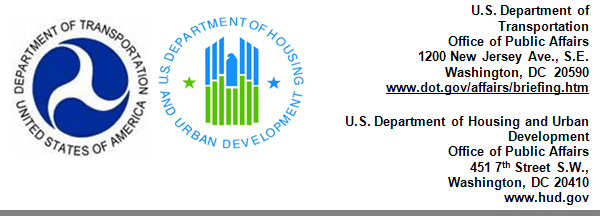DOT, HUD Announce New Contracting Flexibility to Help Build Sustainable, Livable Communities

DOT 126-10
DOT Contact: Doug Hecox
202-366-0660
HUD No. 10-134
HUD Contact: Andrea Mead
202-708-0685
Transportation Secretary Ray LaHood and Housing and Urban Development Secretary Shaun Donovan today announced new contracting efforts that will enhance livability and sustainability initiatives and improve competition for federal highway projects.
The new process removes conflicting HUD and Federal Highway Administration (FHWA) contracting requirements, giving state and local agencies more flexibility. In addition, it promotes livable and sustainable communities, places where transportation, housing and commercial development investments have been coordinated so that people have access to adequate, affordable and environmentally sustainable travel options near their homes, by delivering projects sooner and at reduced costs. The new process does not allow transportation dollars to be used for housing related improvements.
"We are committed to innovation, removing barriers to employment, improving livability and improving government service to the American people," said Secretary LaHood. "Bringing these two programs together gives Americans more for their tax dollar."
"This is another example of the Obama Administration's commitment to changing the way the federal government operates and making it work better for Americans by breaking down silos and making smarter investments," said Donovan. "This will extend the impact of federal investment from buildings and roads directly to economic opportunities for low-income people and the companies who hire them"
A notice published in the Federal Register, will permit - on a case-by-case basis - the application of HUD local hiring requirements on projects funded by FHWA.
Current HUD contracting rules, which require that low-income people living in a project area be hired as a condition of funding that project, conflict with FHWA rules that discourage hiring preferences. Consequently, states managing projects like street reconstructions near HUD-managed properties must award two contracts: one for FHWA-funded roadwork, and another for HUD-funded work, such as the relocation of underground sewers, utilities or water pipes serving the HUD property.
Today's Federal Register notice invites states to submit proposals to FHWA that improve contracting efficiencies while enhancing livability and sustainability in projects funded jointly with HUD. The proposals will be evaluated based on the extent to which HUD funding may be used for highway projects, the effects on competition whenever HUD's local hiring preferences are applied on a joint FHWA/HUD project, and the extent to which the alignment of FHWA and HUD requirements improve livability and sustainability.
Moving to one larger, more inclusive contract would likely widen the appeal of such work to potential contractors, and eliminating multiple small contracts would save taxpayers money.
This initiative builds on the Partnership for Sustainable Communities, an innovative new interagency collaboration, launched by President Obama in June 2009, between the Department of Transportation (DOT), the Department of Housing and Urban Development (HUD) and the Environmental Protection Agency (EPA). Guided by six Livability Principles, the Partnership is designed to remove the traditional federal government silos that exist between departments and strategically target the agencies' transportation, land use, environmental, housing and community development resources to provide communities the resources they need to build more livable, sustainable communities.
# # #
HUD's mission is to create strong, sustainable, inclusive communities and quality affordable homes for all. HUD is working to strengthen the housing market to bolster the economy and protect consumers; meet the need for quality affordable rental homes: utilize housing as a platform for improving quality of life; build inclusive and sustainable communities free from discrimination; and transform the way HUD does business. More information about HUD and its programs is available on the Internet at www.hud.gov and espanol.hud.gov.
